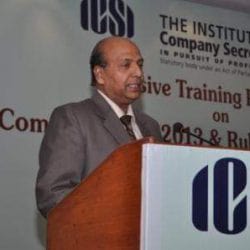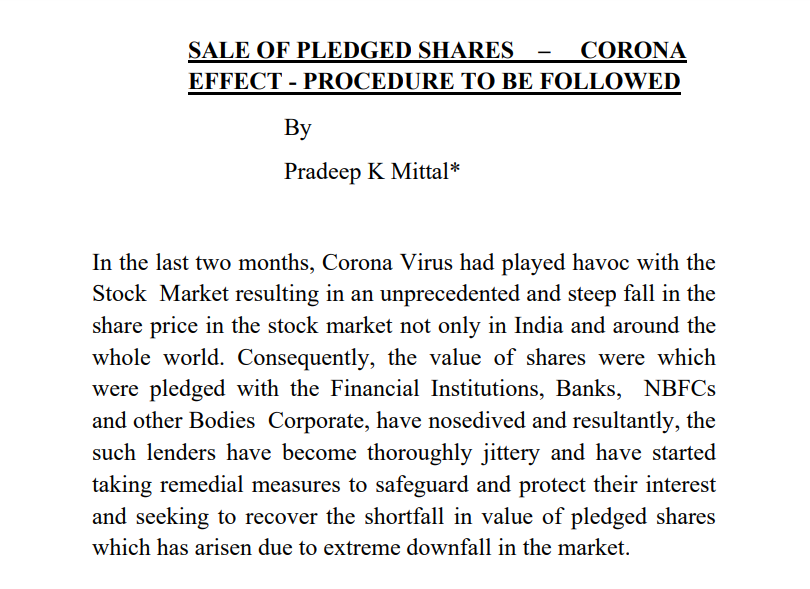SALE OF PLEDGED SHARES – CORONA EFFECT – PROCEDURE TO BE FOLLOWED
- SALE OF PLEDGED SHARES – CORONA EFFECT – PROCEDURE TO BE FOLLOWED
- Section 176.
- 2.1: Thus Section 176 vests in the pawnee two distinct rights in case of default namely:
- TRIGGER POINT FOR INVOCATION OF PLEDGED SHARES:
- CAN A WAIVER OF NOTICE BE ALLOWED:
- WHEN AT WHAT POINT OF TIME, PLEDGED SHARES CAN BE SOLD.
- Download the copy:
SALE OF PLEDGED SHARES – CORONA EFFECT – PROCEDURE TO BE FOLLOWED
In the last two months, Corona Virus had played havoc with the Stock Market resulting in an unprecedented and steep fall in the share price in the stock market not only in India and around the whole world. Consequently, the value of shares was which were pledged with the Financial Institutions, Banks, NBFCs and other Bodies Corporate, have nosedived and resultantly, such lenders have become thoroughly jittery and have started taking remedial measures to safeguard and protect their interest and seeking to recover the shortfall in the value of pledged shares which has arisen due to extreme downfall in the market.
2: In order to appreciate and analyze the duties, obligations, and rights of the Pawnee of the pledged shares i.e. FIs, Banks, NBFCs and Bodies Corporate (hereinafter called Lenders), with whom either the borrowers or guarantors have pledged their shares for securing the loan, credit facilities and other financial arrangements, we have to see Section 176 Indian Contract Act, 1872, which is reproduced below:
Section 176.
Pawnee’s right where pawnor makes default
If the pawnor makes default in payment of the debt, or performance; at the stipulated time or the promise, in respect of which the goods were pledged, the pawnee may bring a suit against the pawnor upon the debt or promise, and regain the goods pledged as collateral security; or he may sell the thing pledged, on giving the pawnor reasonable notice of the sale.
If the proceeds of such sale are less than the amount due in respect of the debt or promise, the pawnor is still liable to pay the balance. If the proceeds of the sale are greater than the amount so due, the pawnee shall pay over the surplus to the pawnor.
2.1: Thus Section 176 vests in the pawnee two distinct rights in case of default namely:
1:To see the pawner upon the debt and retain the goods or collateral as security, or
2:To sell the pledges goods/shares which have been pledged after proper notice of such a sale has been transmitted to the pawner.
2.2: Section 176 envisages that if the pawnee is to exercise his right of sale, in that event, pawnee must do so after he makes a notice of the same to the pawner. Making of notice is a statutory obligation and thus even though it is mentioned in the terms of the contract that notice is not necessary, still the pawnee is obliged to serve a notice. A notice of sale must be given in all cases of pledge even when an instrument of pledge contains unconditional power of sale. The contents of the notice and when and in what manner to issue is left to the discretion of the pawnee but, however, the notice must be served upon the pawner. With this background, various judgments have been discussed below:
TRIGGER POINT FOR INVOCATION OF PLEDGED SHARES:
3: If the pawner (i) makes default in payment of the debt, (ii) of performance; at the stipulated time or (iii) the promise, in respect of which the goods were pledged, the pawnee may, interalia, sell the goods pledged, on giving the pawnor reasonable notice of the sale. If the proceeds of such sale are less than the amount due in respect of the debt or promise, the pawnor is still liable to pay the balance. If the proceeds of the sale are greater than the amount so due, the pawnee shall pay over the surplus to the pawner.
4: The Hon’ble Calcutta High Court in Neekram vs. Bank of Bengal (ILR 19 Cal 322) held that the sale of pledged goods to the bank itself was unauthorized and, therefore, upon the appeal by the Bank, the matter was heard by the full bench of Hon’ble Calcutta High Court. The Full Bench held that selling of the pledged shares without further notice and without further demands was a wrongful act by the Bank for which they are liable to pay.
CAN A WAIVER OF NOTICE BE ALLOWED:
5: The Hon’ble Bombay High Court in the case of “Official Assignee of Bombay v. Madholal Sindhu &Ors.” – ‘MANU/MH/0052/1946 has held that in an agreement executed between the parties, parties cannot keep covenants that the notice need not be given or pawner waive such notice, such types of covenants go contrary to the mandate of Section 176 and observed as under:-
“If one looks at the various sections of the Indian Contract Act, one finds that some of them specifically mention “in the absence of a contract to the contrary.” There is no such saving clause in S. 176, and in my opinion, the provisions are mandatory and it is not open to parties to contract themselves out of those provisions.”
6: In any case, if the shares are transferred to itself by the pledgee/pawnee, it would amount to conversion and forfeiture and is impermissible and in this connection, various judgments may kindly be referred to viz: Neikram Dobay v. Bank of Bengal, 1891 LR 60, Official Assignee, Bombay v. Madholal Sindhu, 1946 ILR Bom 1, GTL Ltd. v. IFCI Ltd., MANU/DE/3341/2011: 2011 (126) DRJ 394, Balakrishna Gupta v. Swadeshi Ploytex, MANU/SC/0024/1985 and Lallan Prasad v. Rahmat Ali, MANU/SC/0070/1966 have all held that sale of shares by the pledgee to itself would be a void contract.
7: In a very comprehensive judgment, the Delhi High Court, in GTL Limited v. IFCI Ltd MANU/DE/3341/2011 has observed as under:-
The provisions of Section 176 Contract Act are mandatory. The applicability and sweep of Section 176 unlike several other provisions on the same subject are not eclipsed by the phrase- “in the absence of a contract to the contrary.” The notice that is to be given to the pledger of the intended sale by the pledgee is special protection which statue has given to the pledger and parties cannot agree that in the case of any pledge, the pledgee may sale the pledged articles without notice to the pledger.
(ii) If a sale is held of the shares under the authority of the pledger then it could convey to the purchaser full title in the shares; sale under Section 27 of Sale of Goods Act title conveyed to the purchaser would not be a title better than that of the seller.
(iii) Notice under Section 176 of the Contract Act must be given before the power of sale can be exercised. If the notice is essential, the purchaser, however innocent cannot acquire a title better than his vendor has.
(iv) Right to redeem under Section 177 can be exercised up to the time the actual sale of the goods pledged takes place.
8: The Single Judge of Delhi High Court in Tendril Financial Services Pvt. Ltd. and Ors. V/s. Namedi Leasing and Finance Limited MANU/DE/1275/2018 also submitted that in case the pledged shares held in Demat form, there is no place for a prior notice under Section 176, in the scheme of Regulation 58 of the Securities and Exchange Board of India (Depositories and Participants) Regulations, 1996. However, the Learned Single declined the following precedence judgment of the Single Judge Delhi High Court in the case of GTL Vs. IFCI MANU/DE/3341/2011 by simply observing that the shares were in Demat in GTL case also and hence, hence, no notice required. It is most respectfully submitted the judicial precedence was required to be followed and just because shares were Demat form, is absolutely no, ground to differ and Demat is the only mode of keeping the pledged shares and no provision of law overrides the provisions of Section 176 of Act.
9: The National Company Law Tribunal, Ahmedabad Bench, in the case of Power Finance Corporation Ltd. vs. Shree Maheshwari Hydel Power Corporation Ltd. MANU/NC/0494/2017 has observed as under:-
It is the case of the petitioner that he has issued 30 days reasonable notice but he did not choose to file a copy of the notice. As already said, there is only fifteen days’ time gap between the date of notice and the date of transfer of shares. Therefore, this Tribunal is of the view of invocation of the shares by the petitioner has not been done validly
10: The Supreme Court in the case of Lallan Prasad vs. Rahmat Ali MANU/SC/0070/1966, while dealing with the rights of the Pledgee/Pawnee, has observed as under:-
So long, however, as the sale does not take place the pawner is entitled to redeem the goods on payment of the debt. It follows therefore that where a pawnee files a suit for recovery of debt, though he is entitled to retain the goods he is bound to return them on payment of the debt. The right to sue on the debt assumes that he is in a position to redeliver the goods on payment of the debt and therefore if he has put himself in a position where he is not able to redeliver the goods he cannot obtain a decree.
WHEN AT WHAT POINT OF TIME, PLEDGED SHARES CAN BE SOLD.
11: The Division Bench of Calcutta High Court in the case of Hulas Kunwar vs. Allahabad Bank Ltd. : MANU/WB/0159/1958, has observed that Bank is within its rights to sell the shares at any time in the future after giving proper notice to the Pawner.
The Bank was within its rights in selling shares and Bank would sell the shares “as and when opportunity offers” which means as and when market conditions are most favorable. The law does not require that the pawnee should arrange for the sale beforehand and then give the pawner a notice of the date, time and place of that sale. All that is necessary is that a notice should be given of the pawnee’s intention to sell in default of payment by the pawner within a specified date. This was the’ view taken by the Allahabad High Court in the case of Kunj Behari Lal v. The Bhargava Commercial Bank ILR All 522: (AIR 1918 All 363.
12: In a very recent case, the Bombay High Court in the case of Reliance Project Ventures and Management Pvt. Ltd. and Ors. vs. ECL Finance Limited and Ors (MH/0373/2019), where one day’s notice was given under Section 176 of the Contract Act, it was held to be sufficient notice and Court has observed about the scope and intent of this Section in the following manner.
Section 176 makes it clear that it is the discretion of the pledgee to sell the pledged goods (shares in this case) in case the pledger makes default and if the pledgee exercises that discretion or does not exercise that discretion, no blame can be put on the pledgee. What is required is if pledgee decides to exercise its discretion to sell, it has to give reasonable notice of sale to pledgors (emphasis supplied). In this case, defendants have given reasonable notice as observed earlier. I find support in National Securities Clearing Corporation Ltd. V/s. Prime Broking Company (India) Ltd.
It may, however, be clarified that it was only an interim order and not a final judgment.
13: The Delhi High Court in Bank of Maharashtra v. Racmann Auto (P) Ltd., MANU/DE/0039/1991, the question which came up for consideration was whether there was any legal duty cast on the plaintiff-Bank to take early steps for disposing of the pledged goods. Construing Sec. 176, it was held that the very wording of the Section makes it clear that it is the discretion of the pawnee to sell the goods in case the pawnor makes default but if the pawnee does not exercise that discretion, no blame can be put on the pawnee and pawnee has the right to bring a suit for recovery of the debt and retain the goods pledged as collateral security.
14: The Madras High Court in Mahesh Bharathan Vs. Bank of Baroda CWP No.4828 of 2011 under final judgment dt.23.1.2018 has observed that a notice under Section 176 cannot be implied. Such notice has to be clear and specific language indicating the intention of pawnee to dispose of the security. No such intention was disclosed by the Bank in any letter to the Respondent.
15: In substance, the notice Section 176 is mandatory and cannot be inferred or implied, conveying clear and specific intention to Pawner to sell the pledged shares and the said pledged shares/goods cannot be appropriated or transferred to Pawnee itself.
Download the copy:
If you already have a premium membership, Sign In.
 Advocate Pradeep Kumar
Advocate Pradeep Kumar
PK Mittal BCom Delhi university 1975 LLB Delhi University 1978 FCS Fellow Member of ICSI 1992 1982 to 1992 as CS in Corporate Head Legal Apollo Tyres Ltd 1986 to 1992 1993 onwards Advocate in Delhi High Court CESTAT NCLT = Practcising Indirect Tax and Corporate laws 1993 to till date. Written more than 100 Article on Company Law and Corporate laws Indirect Tax Speaker on Indirect Tax Co Law and IBC in various Seminars Workshop organised by ICAI ICSI and ICMA and other organisations Convenor Core Group on GST of ICSI













